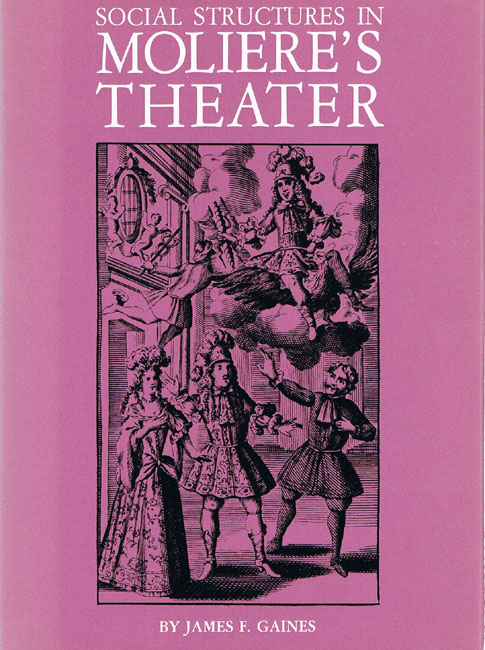Social Structures in Molière’s TheaterJames F. Gaines |
 1984 Literary Criticism / European / French; Performing Arts / Theater / History & Criticism 283 pp. 6x9 |
|||
|
read the full text of the book •
|
In an age obsessed with rank and preoccupied with social position, in which men were sedulous in their obedience to the imperious demands of a rigid etiquette and elaborate ceremonials, and in which ambitious and worldly men saw correct behavior as the means, and advancement and preference as the goal, Jean-Baptiste Poquelin assumed the role of jocular critic of behavioral abuse. James F. Gaines has undertaken a sociocritical study that attempts to understand how the literary forms of Molière’s plays relate to the social forms of the early modern period. He contends that the comedies represent an imaginary network of social relationships remarkably homologous to the world view of the literate French public during the reign of Louis XIV, and that it is possible both to identify the place in society of characters in Molière’s plays through reference to an index of social indicators and to ascertain whether or not the patterns of behavior of those individuals are consistent with the norms governing the classes to which they belong—norms that Gaines has been able to reconstruct on the basis of seventeenth-century social theory and from historical evidence. The audience’s early identification of a dramatic character’s status in society from clues planted by the dramatist was of crucial importance to the success of Molière’s comedies; for his ability to deal effectively with a very wide range of social subjects depended on a rapid exposition of just what places his characters occupied in the intricate and complex network of social relationships. Seven of the most salient social indicators were the money a character possessed, the offices he held, the clothing he wore, the servants he employed, the houses and lands he owned, the mode of transportation he employed, and the language he spoke. Such externals as these were commonly regarded as the outward manifestations of an individual’s essential virtue and caractère. They constituted for him and for others the conditions of any contacts he would make and any relationships he would form; and his awareness and understanding of them would determine his prospects for success—and the expectations of others for his success—in any courtship or seduction, anoblissement or usurpation, that he attempted. Unlike the medieval société d’ordres that it had replaced by the seventeenth century, the société d’états afforded the prospect of limited social mobility. All opportunities for advancement depended on the possession of large sums of money, and a formidable apparatus for social closure stood in the way of anyone who presumed to rise in society without first satisfying – slowly and at great expense—the conditions of his occupying the place in the hierarchy to which he aspired. In his theater of social differentiation, Gaines concludes, Molière successfully mediated the mulitfarious disparities among the highly diverse groups that made up the société d’états. His contemporaries found in his drama an illustration—in praxis and not merely in theory — of the great chain of social being. As the consummate comic playwright and social commentator of his time, Molière ingeniousy exploited what became in his hands the virtually unlimited possibilities of combining the incongruities of humor—the joke, the trick, the pun, the humiliating episode or situation—with the social dissonances of his time: unworthiness, usurpation, pretentiousness, and parasitism. His genius enables us to perceive that the clown who fails to retain his balance on the stage, and the fool who loses his equilibrium in society, are, at bottom, victims of the same vertigo. James F. Gaines is associate professor of foreign languages at Southeastern Louisiana University in Hammond. | |||

